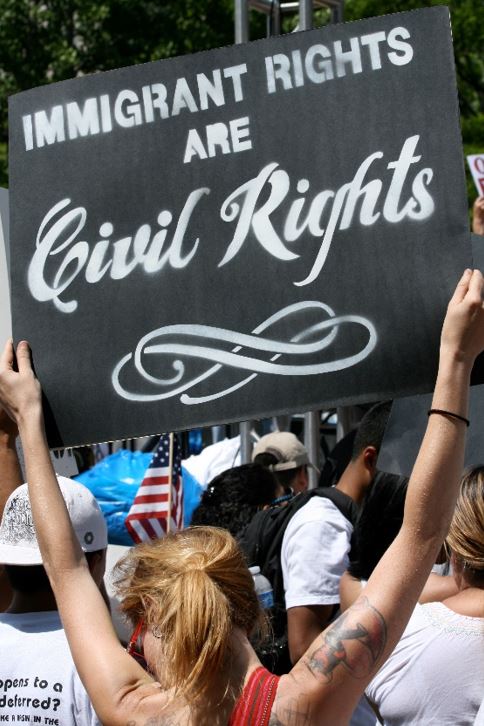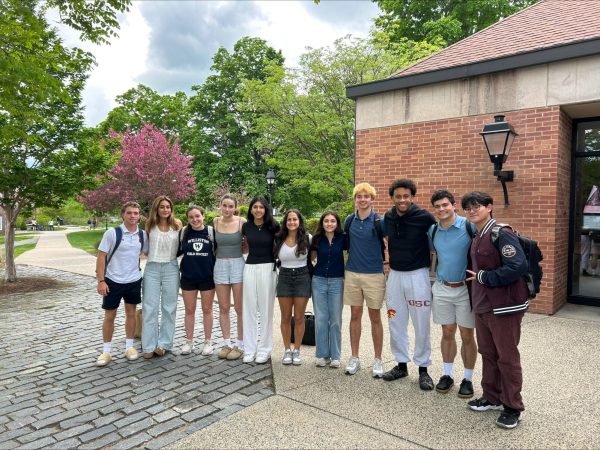Sanctuary Status at Williston?
Colleges and universities across the country have officially declared themselves sanctuary campuses for undocumented students in the wake of President Donald Trump’s immigration policies. And while the suggestion has come up at boarding school Phillips Exeter, the discussion about sanctuary campuses has not reached Williston.
“We actually haven’t had a debate about it here,” said Mr. Hill. “I think that if it were a recommendation from the school to do that, to embrace that phrase, then it would probably be a Board of Trustees decision.”
A sanctuary campus is modeled after sanctuary cities, where officials have pledged to protect undocumented immigrants against deportation. “I think the most important conversation is not whether you are a sanctuary campus, but the questions that lie underneath that label,” said Mr. Hill. “You know, what kind of a place are you? Are you a welcoming place? Are you a safe place for all students? Do all students feel respected regardless of their religion, regardless of their status in the majority or minority? I think that’s the most important thing.”
The Five College Consortium have all shown support for undocumented immigrants, and Smith and Amherst have officially declared themselves sanctuary campuses. UMass and Mt. Holyoke are still waiting for a decision, while Hampshire has not been as active in this issue as the other colleges.
Two colleges in the Ivy League, UPenn and Columbia, have declared themselves sanctuary schools. Cornell and Dartmouth show support for undocumented immigrants, but do not want to take on the official title. Brown, Princeton, and Harvard also show support for undocumented immigrants, but have officially denied students’ requests for sanctuary, arguing that it has no legal basis.
“Sanctuary campus status has no legal significance or even clear definition,” Harvard President Drew G. Faust told The Harvard Crimson. “It offers no actual protection to our students. I worry that in fact it offers false and misleading assurance.”
Mr. Hill agreed that the term “sanctuary campus” can be confusing and misleading. “If we were ever in the position to have state or federal authorities ask us about any undocumented students who might be here, we would simply do what we have to do according to the law. And as I understand the sanctuary thing, it’s not really a sanctuary,” he said.
Easthampton is in the midst of a heated debate about changing their status, while officials in surrounding towns Northampton, Holyoke, and Amherst have already declared their towns sanctuary cities.
The number of sanctuary cities and campuses have increased since the election of Donald Trump, who promises to deport between two to three million undocumented immigrants. On January 25th he signed an executive order saying he would halt funding to cities that did not cooperate with federal immigration officers. Another executive order banned immigration from Iran, Iraq, Syria, Sudan, Libya, Yemen and Somalia. San Francisco, sanctuary city since 1989, is suing President Trump for his executive order.
Williston does not have any undocumented students, but there are some Muslim students. No students have passports from the seven banned countries, but Mr. Hill still cares about the consequence of such a ban.
“We have Muslim students here who are affected by that, and I care very much about that. And that’s not a political statement, that’s a humane statement,” he said. “As an educator I have always been very, very sensitive and sensitized to the experience of any underrepresented person, in whatever community I’ve been in. Whether that is based on religion or gender identity or gender or whatever.”
Roya Mostafavi ’18 said President Trump’s ban is harmful and condones blatant discrimination. “Regardless of the fact that I am a non-practicing Muslim, in President Donald Trump’s eyes I am a Muslim and I am a threat to the country,” said Mostafavi. “I am scared of the Islamophobia his presidency is promoting and the possibilities his presidency holds. I am not afraid of the man himself, but of the damage he and his presidency can do to the country I was born and raised in.”
Ms. Erin Davey, Williston’s assistant dean and director of inclusion and student activities, believes it is her responsibility to ensure that all students and faculty feel they have a voice and a safe space on campus. “[Williston] is a school that welcomes students and faculty from all over the world and this country,” said Ms. Davey. “We hire faculty with high levels of empathy, willingness to work through difficult and complex situations, and the ability to see the promise in all students, no matter where they are from culturally, globally, ethnically, socially, what gender and sexual orientation they identify with, their religion, or socioeconomic status. That is an expectation of our faculty and a practice we hope all students will adopt during their time at Williston.”
Ellie Scott ‘18, president of the junior class and Young Democrats Club, said the club would support making Williston a sanctuary campus. “It is important to be welcoming to all students here at Williston,” she said.
The President of the Young Republicans Club, Alex Foster ‘17 does not support the idea of Williston becoming a sanctuary campus and said that it breaks the law. “It is out of Williston’s hands because institutions cannot and should not be able to choose which laws they want to adhere to, and which they want to disregard, depending on their moral stance at the time,” he said. “The laws of this country are based around mutual and general respect trust and compliance with them, therefore it would not only be illegal for Williston to become a ‘Sanctuary Campus,’ but it would be an erosion of the American scheme of democracy.”
Ms. Davey said becoming a sanctuary campus is an effort to support and protect undocumented students. “I see it is our job to protect our students. So yes, I would like to see Williston become a sanctuary campus – and we’d be the first prep school to identify as such.”
Sophia is a six-year senior from Northampton, MA. She likes to play lacrosse and talk to her sister in a funny voice.








